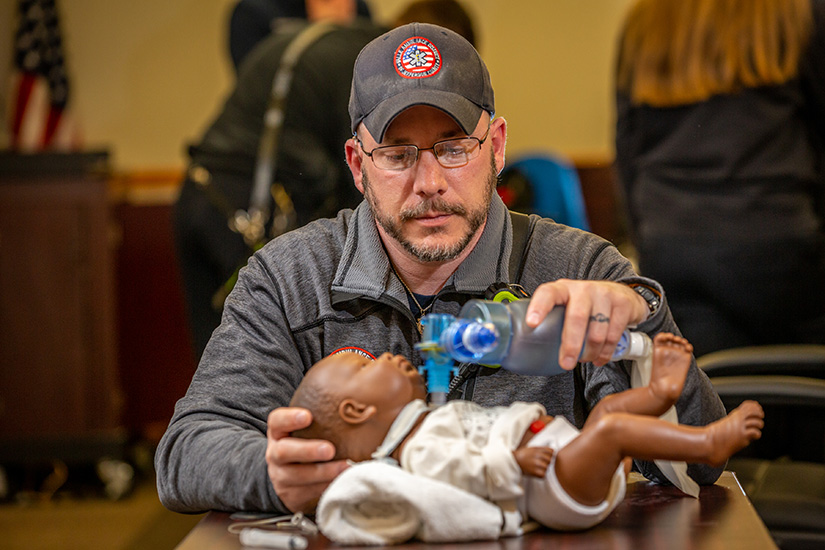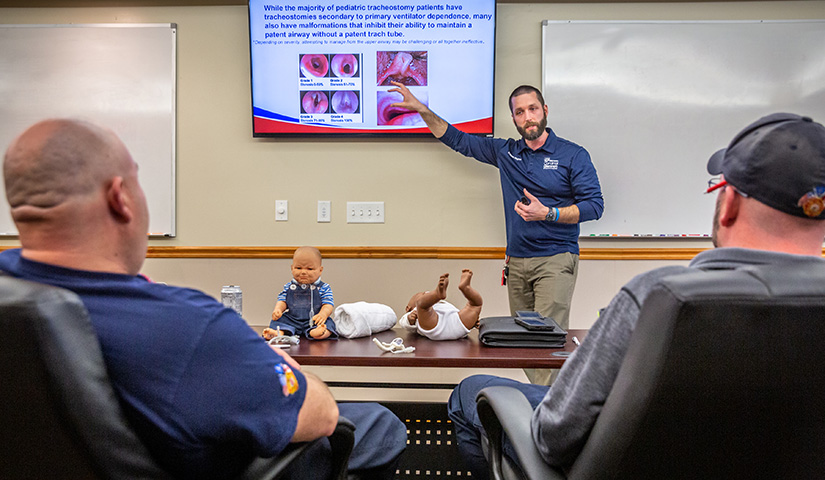 Emily Revelle and her son, Bradley, played at Laumeier Sculpture Park in Sunset Hills. Emily Revelle said she is thankful for the STARS (Special Needs Tracking and Awareness Response System) program.Photo Credit: Lisa Johnston
Emily Revelle and her son, Bradley, played at Laumeier Sculpture Park in Sunset Hills. Emily Revelle said she is thankful for the STARS (Special Needs Tracking and Awareness Response System) program.Photo Credit: Lisa JohnstonThree-year-old twins Bradley and Joel Revelle were born at 24 weeks and spent significant time in the neonatal intensive care unit.
Bradley, who has more medically complex issues than his brother, has been a frequent visitor to the hospital since discharge. He has cerebral palsy, a ventriculoatrial shunt which enables fluid to flow from the cerebral ventricular system to the atrium of the heart and, within the last year, seizures.
When he had his first seizure in April of 2018, his parents called 911 for help. It was what Bradley’s mom, Emily Revelle, called, “A very scary ambulance experience.”
Emily and Bryan Revelle’s anxiety is lessened now, however, after learning about the STARS (Special Needs Tracking and Awareness Response System) program of SSM Health Cardinal Glennon Children’s Hospital.
They enrolled Bradley in STARS and met with emergency personnel from Crestwood and Abbott, who serve their community. “Crestwood has a relatively older population, so pediatrics experience was invaluable for them to have,” Emily Revelle said. “The total lack of pediatric training that EMTs and paramedics receive is alarmingly little and focuses on well kids getting sick, not sick kiddos getting sicker.”
The STARS program helps coordinate and coach ambulance districts, fire districts and community hospitals to recognize the special needs of patients inside their coverage area. It also helps provide appropriate, specialized training to care for these patients’ special medical needs. Having pertinent patient information in the hands of the medical professionals enables them to know what they should expect when they arrive on scene.
The help provided for emergency medical personnel differs depending on the severity of the child, the distance from the hospital and whether STARS has been to the fire or ambulance district for training.
Since the first incident, the Revelles have sought emergency assistance four times, getting help from responders who’ve been trained by STARS and were familiar with Bradley’s issues. Emily Revelle said that “the relief that comes knowing that they have his history, allergies and conditions at their fingertips before arrival makes a scary and overwhelming situation just a little bit easier. The crews have come to know him and are very familiar with how he presents during a seizure and can easily identify anything out of the ordinary for him and treat accordingly. This ease of treatment and level of comfort would be next to impossible without STARS.”
Patricia Casey, an SSM Health Cardinal Glennon staff member who is coordinator of STARS and a co-founder of the program, said that “we tell parents to call 911 for an emergency. But no one in the past has stopped to make sure 911 was prepared to take care of these kids,” she explained.
“If we have a child going home with a tracheostomy or home ventilator in an area we hadn’t been to before and where they don’t have any STARS children with those issues, we make every effort to get there as close to discharge as possible, if not prior to that time,” Casey said. They’ll train as many people as possible, including staff at the closest community hospital and flight and ambulance services.
“We prepare for worst-case scenarios,” she said. “We don’t expect this to happen but we want you ready in case it does.”
STARS also helps parents understand that they train for catastrophic events, she said.
Casey gave the example of Brad Perry, manager of emergency services at HSHS St. Elizabeth’s Hospital in O’Fallon, Ill., who in concert with STARS helped contact emergency personnel to set up tracheostomy and vent training for a patient who was in the neonatal intensive care unit and was about to go home. Perry not only organized the class with EMS, air medical and hospital personnel, but he also visited the family to gain a full understanding of their needs.
The rural areas are a special concern because of the distance from SSM Health Cardinal Glennon. Casey cited a training before a child went home to Greenville, Ill., in which ground and air emergency services and a representative of HSHS Holy Family Hospital visited SSM Health Cardinal Glennon to link with the child’s family.
Casey is re-energized each time she hears of a situation where the training saved a life. “We’ve had quite a few success stories where children have gotten treatment that they might not have gotten without STARS — more appropriate treatment where seizures were recognized or their airway was taken care of when prior to STARS they may not have been” treated properly, she said.
 Captain Nick Wilcox practiced on a dummy during a STARS training class in tracheostomy technique at Valle Ambulance District in DeSoto in April. Photo Credit: Lisa Johnston
Captain Nick Wilcox practiced on a dummy during a STARS training class in tracheostomy technique at Valle Ambulance District in DeSoto in April. Photo Credit: Lisa JohnstonThe tagline for STARS is “One Kid Counts,” and Casey explained why. “We take every single one seriously,” she said. “People just assume that their prognosis is poor when that’s not always the case. A lot of our kids have a good prognosis. They’ve just hit a bump in the road. We’re trying to help them through that. They’re not going to be on a trach and a vent forever, they’re going to get better and stronger.”
The STARS staff “takes it really, really hard when any of our kids has a bad outcome in the field. No matter what their prognosis is, it’s not OK.”
Casey recently spoke in Atlanta to the Children’s Hospital Association about STARS. The most frequent question she received was about the cost and funding for it. She told them that the SSM Health Cardinal Glennon Foundation funds it, “and they couldn’t believe this is something our hospital just pays for. The administration here from the very beginning said STARS fits the Cardinal Glennon mission — that keeping these kids safe is just the right thing to do.”
The mission of SSM Cardinal Glennon helps with her faith life, said Casey, who attends a Presbyterian church. “I almost feel it more here than at church,” she said. Cardinal Glennon’s mission statement, which is sometimes referred to as the Glennon factor, is: “Through our exceptional health care services, we reveal the healing presence of God.”
Chris Torno, a firefighter/paramedic with the Eureka Fire Protection District, said one of the scariest types of calls EMS professionals respond to are those that involve children with special needs because of unknown factors, but having a plan in place “really helps.” The STARS model “is an exceptional program that EMS agencies and hospitals should consider adopting,” he added.
The program ensures the children are better cared for and those who respond are better prepared, Torno said. Fifteen children with special needs are served in his district, and about 300 in St. Louis County, he said. He’s had a number of interactions with them, including a child with seizures who they’ve helped several times. Another child has a bleeding disorder. Paramedics provided medication, and he recovered safely at home. Without STARS, he would have been transported to the hospital, Torno said. “The STARS program is saving his family and insurance thousands of dollars,” he added.
Glennon Sunday
Glennon Sunday is celebrated on June 2. The funds raised in parishes of the archdiocese help serve 200,000 children each year.
The Catholic hospital — seen as a place where faith and healing unite — serves all children, regardless of the financial circumstances of their families. The appeal funds critical departments, life-saving treatments, charity care and more in state-of-the-art facilities.
Catholics of the archdiocese raised $6.2 million in the 1950s to fund construction of the hospital. That spirit of giving continues today.
You can make your gift at Mass on Glennon Sunday weekend or online at www.glennon.org.
STARS: Special Needs Tracking and Awareness Response System
The STARS program helps coordinate and coach ambulance districts, fire districts and community hospitals to:
• Recognize the special needs of patients inside their coverage area
• Undergo the appropriate, specialized training to care for these patients’ special medical needs. The goal is to have pertinent patient information in the hands of the medical professionals before they even arrive at the patient’s side. This way they can provide the care needed immediately and skillfully. Ultimately, this decreases anxiety, pain and unnecessary measures for the patient. It also decreases stress on the health care provider. The goal is to achieve better outcomes for patients, faster.
No dummies
 Nicholas Salzman, STARS program liaison and trainer, taught a class in tracheostomy technique at Valle Ambulance District in DeSoto.Photo Credit: Lisa Johnston
Nicholas Salzman, STARS program liaison and trainer, taught a class in tracheostomy technique at Valle Ambulance District in DeSoto.Photo Credit: Lisa JohnstonNicholas Salzman, STARS program liaison, is no dummy. But he comes with two dummies — realistic-looking infant dolls — to training sessions he teaches. It’s a way of helping his fellow paramedics and EMTs be smart when responding to children with exceptional health needs.
In a recent class at the Valle Ambulance District in De Soto, Salzman asked the emergency personnel to imagine themselves on the roadside responding to a call of a vehicle with an infant having difficulty breathing. The 10-month-old is strapped in a car seat, unresponsive and has a tracheostomy tube and needs her airway improved.
Salzman quizzed the class on steps to take, then helped them practice on the dummies.
Emily Stefan, a paramedic who attends Sacred Heart Parish in Festus, appreciated the training, saying, “It furthers our knowledge by preparing for the worst. Practice makes perfect.”
Paramedic Alex Wilson praised SSM Health Cardinal Glennon Children’s Hospital for the training. He cited the low frequency of calls for children with the severe health needs yet the high level of skill needed to respond. “We love having these trainings,” he said.
Nick Wilcox, a captain and paramedic, called the class “a good refresher. They’re definitely a good resource. We learn a lot.”
STARS (Special Needs Tracking and Awareness Response System) works because SSM Health Cardinal Glennon funds the program and its physicians offer guidance to first responders. The program began in 2014 as a partnership with the Rock Township District in Arnold. Each child in the program gets a STARS identification number with their health history.
A National Delphi Survey by the Children’s Safety Initiative/Emergency Medical Services for Children in 2016 showed that 75 percent of a sample group of paramedics, EMT-Basics/first responders and physicians identified a lack of experience with advanced airway management in children. STARS training is changing that statistic, Salzman said.
Besides respiratory problems and seizures, other special health care needs include cardiac issues, autism spectrum disorders and developmental delays.